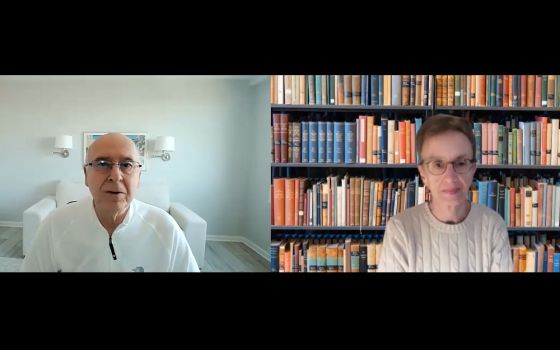
(Unsplash/Annika Gordon)
Editor's note: This Lent, NCR will host live spiritual conversations every other week, hosted by our Soul Seeing editor, Michael Leach. Today, join Fr. Dan Horan at 1:30 p.m. Central/2:30 p.m. Eastern live on Facebook or YouTube for a conversation about Lent during a time of pandemic. The videos will also be recorded for viewing after the event.
For many people, Lent is associated with certain kinds of sacrifice: giving up something one enjoys for the season, abstaining from meat on Fridays and fasting on prescribed dates. These forms of voluntary self-denial have served the Christian faithful well over the centuries as a set of practices that help take us out of our daily routines and ordinary life in order to renew ourselves in living the Gospel.
But what does it mean to approach the penitential season of Lent in a time of global pandemic in which nearly everybody has experienced involuntary self-denial ranging from the prohibition of travel and leisure activities to imposed distance from loved ones and family members, including the tragedy of not being with loved ones in person as they left this world at the end of life?
For some, the idea of imposing further burdens on themselves or others under the guise of "spiritual renewal" seems cruel or perhaps an invitation to masochism at this moment in history. And I am deeply sympathetic to that view. This is all the more true when one views practices of asceticism as simply ends in themselves and not means toward something greater — when one looks at the traditional Lenten triad of fasting, prayer and almsgiving as a form of "punishment" rather than an opportunity to redirect one's attention, energies and priorities from the quotidian to the spiritually transformational.
However, I think this particular Lent is a time in which spiritual transformation, ongoing conversion, and personal and communal renewal is needed more than ever. It just might mean that we don't go to our classical Lenten storage closet on Ash Wednesday to dust off our usual penitential practices.
There's a strikingly simple and profound line in the catechism section on "The Many Forms of Penance in Christian Life." Paragraph 1434 begins: "The interior penance of the Christian can be expressed in many and various ways" (emphasis added). The passage then recounts how Scripture and ancient church theologians regularly pointed to fasting, praying and almsgiving as exemplary forms of such "interior penance," but that the focus ought to be "conversion in relation to oneself, to God, and to others."
Advertisement
Conversion is supposed to be the point, not the practices themselves. Which suggests to me that one key way we can approach the season of Lent during the pandemic is to return to the basics, to turn away from the minutiae of religious trappings and personal preferences and turn toward Christ and the Gospel.
Sadly, for some people, scrupulous obsessions about whether or not one is "fasting correctly" or "sacrificing sufficiently" can distract from the point of the voluntary disciplines in the first place. Rather than focusing on turning toward Christ and living out our baptismal vocation through loving words and deeds, such well-intentioned fastidiousness can actually lead to spiritually destructive thinking and behaviors, which Pope Francis has described as "a self-centered and elitist complacency, bereft of true love."
In this case, approaching Lenten practices without the proper discernment for the challenging and exceptional moment in which we find ourselves today can lead to the counterintuitive result of making us less Christian, less Christ-like. I am reminded of Jesus's admonishment of religious zealots who criticized him and his followers for not obsessively observing every minute detail of the religious law: "The Sabbath was made for humankind, and not humankind for the Sabbath" (Mark 2:27).
Likewise, we should remember that the Lenten practices we are typically accustomed to adopting each year were created for humankind, not humankind for these practices.
With this in mind, I want to suggest that Christians take a very different tack this year, one that requires of all of us patience, thoughtfulness and discernment. I believe that a good way to spend Lent in the pandemic is by focusing on the basic practices of our Christian faith.
One Lenten practice that fits the bill is to deepen one's engagement with Scripture. Catholics have a bad reputation among the Christian communities of not knowing the Bible as well as our other baptized sisters and brothers do. Why not set aside some time each day during Lent to read a portion of the Bible, perhaps start with one of the Gospels and read, reflect and pray with the passage? If we allow ourselves to be open to the Holy Spirit's inspiration, sayings and narratives we thought we understood could inform or challenge us in new and timely ways.
Another key element of the Lenten season is a focus on prayer. At a time when it may be unsafe or impractical to worship together on Sundays or during the week as we might have previously, other forms of prayer offer us an opportunity to renew our relationship with God. Prayer, after all, is fundamentally just communication with God. And as St. Augustine said, God is the one who is closer to us than we are to ourselves, which means every moment of every day becomes an opportunity for prayer.
Maybe this Lent is the perfect time to practice paying attention to God's presence in our lives and focusing on how we might better communicate with God, which is to say striving to pray better.
Perhaps the third Lenten practice in the traditional penitential triad — almsgiving — is where we might focus our attention with more enthusiasm this year. It seems that many folks interpret almsgiving a little too literally as exclusively having to do only with financial donations. That is certainly part of what almsgiving is all about, and financial or other material resources are desperately needed by so many this year. But we also have to recognize that many people who would like to share their resources with others are themselves suffering under the pressures of the pandemic-affected economy.
Understood more capaciously, almsgiving is about care of our neighbors, especially those who are most struggling. In a time of great uncertainty, anxiety, isolation and fear, the spirit of almsgiving — that is, giving money or time or attention not only out of our abundance but also out of our primary resources — is needed more than ever.
Any of our Lenten practices that do not support or coincide with care for those among us is of little or no spiritual value. For as the New Testament reminds us, "Those who say, 'I love God,' and hate their brothers or sisters, are liars; for those who do not love a brother or sister whom they have seen, cannot love God whom they have not seen" (1 John 4:20).
Most importantly, this Lent is, more than ever, about taking each day one at a time. As Francis reminds us in his 2018 apostolic exhortation, "Rejoice and Be Glad," our pursuit of Christian holiness requires that we embrace perseverance, patience and humility. God understands the challenges we face this Lent, and invites us to experience divine love and mercy as God accompanies us in our struggles. God is patient with us; ought we not be more patient with others and ourselves?
When so many people have been forced to give up so much already, not by choice but by necessity or tragedy, it is unreasonable and perhaps even unjust to expect of others or ourselves further self-denial. The prophet Hosea reminds us of what God actually expects of us: "For I desire steadfast love and not sacrifice, the knowledge of God rather than burnt offerings" (Hosea 6:6).







